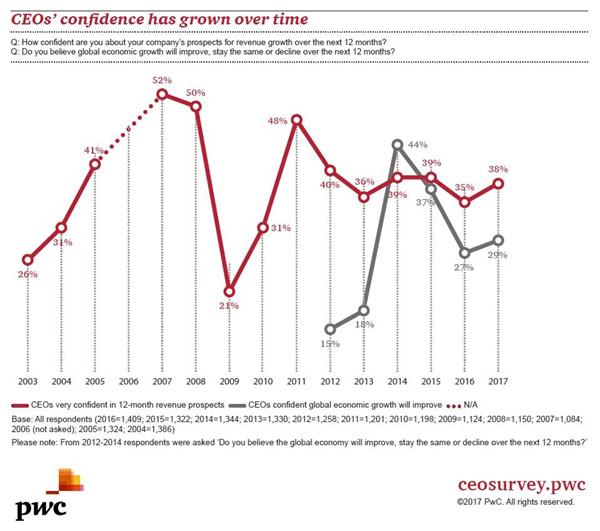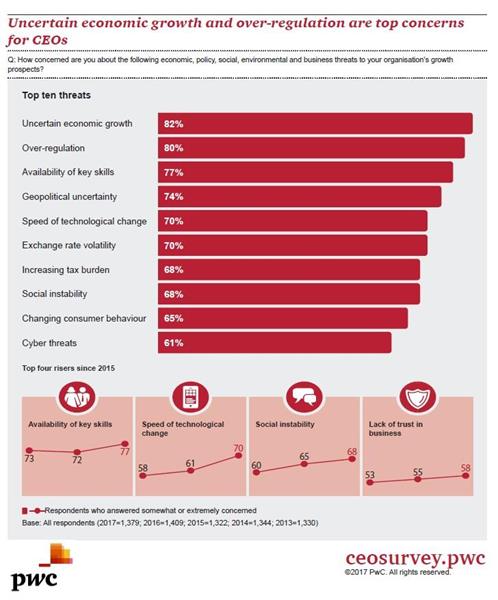While CEOs around the world feel they have plenty to worry about in the year ahead, their confidence in their own growth prospects and their outlook for the global economy are back on the rise. This according to PwC 20th annual survey of CEOs worldwide.
In 2016, 35 per cent of CEOs were very confident about their company’s growth prospects, while 27 per cent believed the global economy would grow. This year, 38 per cent are more optimistic about growth over the next 12 months, while 29 per cent have faith in the economy picking up in 2017.
The findings released at the World Economic Forum in Davos show that while business leaders are more positive in their outlook, their levels of concern about economic uncertainty (82% per cent ), over-regulation (80 per cent ), availability of key skills (77 per cent) remain very high. Also worries about protectionism are growing, with 59 per cent of CEO’s expressing concern. For two in three CEOs in the United States and Mexico,this is a major cause for concern in the year ahead.
41 per cent of CEOs are planning new merger and acquisition activity in 2017
While positive on the benefits of globalisation in building the free movement of capital, goods, and people, CEOs question whether globalisation has done anything to close the gap between rich and poor or mitigated the issue of climate change. This is in contrast to the first PwC CEO survey in 1998 when CEOs were positive about the drivers of globalisation.
PwC’s global chairman, Bob Moritz, explains that changing views are expected in the new decade. “Despite a tumultuous 2016, CEO confidence is moving back up – albeit slowly and still a long way from the levels we saw back in 2007. But there are signs of optimism right across the globe, including in the UK and US, where despite predictions of a Trump slump and a Brexit, CEOs confidence in their company’s growth are up from 2016. And that mood is reflected elsewhere, with more CEOs across the world targeting the US and UK for investment than a year ago,” he says.
While CEOs are more confident in the opportunity for growth, Moritz believes three concerns are still top of mind: a people and technology strategy that creates a workforce fit for the digital age; preserving trust in their businesses in a world of increasingly virtual interactions; and making globalisation work for everyone by engaging ever more with society and collaborating to find solutions. “All topics that will be high up the Davos agenda.”
Confidence in revenue growth climbs
In sharp contrast to 2016, CEO’s confidence in their own one year revenue growth is on the rise in nearly every major country across the world, with India (71 per cent), Brazil (57 per cent), Australia (43 per cent) and the UK (41 per cent) topping the table. Confidence also rose by 11 points in China to 35 per cent, 6 points in the US to 39 per cent.
Bucking the confidence trend are Mexico and Japan where confidence levels have dropped, markedly so in Japan where confidence has plunged from 28 per cent in 2016 to 14 per cent today.
When asked what drives growth, organic expansion tops the agenda for over three quarters of CEOs (79 per cent) in the coming year, while 41 per cent are planning new merger and acquisition activity in 2017 and nearly a quarter of all CEOs intend to strengthen their innovation capabilities to capitalise on new opportunities.
Where CEOs will look for growth
PwC’s first global CEO survey showed emerging markets – including China and India – as a sure bet for success. But the changeability of markets, exacerbated by currency volatility, has caused CEOs to turn to a greater mix of countries. This year’s survey shows the US, Germany and the UK have become bigger priorities, while enthusiasm for investing in Brazil, India, Russia and Argentina has lessened from three years ago.
The top five most important countries for growth identified are the US (1), China (2), Germany (3), the UK (4) and Japan (5) with the UK rising in popularity as a growth destination with CEOs from the US (+4 per cent), China (+11 per cent), Germany (+8 per cent) and Switzerland (+25 per cent).
Shanghai, New York, London, and Beijing were also identified as the top four cities most important to an organisation’s overall growth prospects over the next 12 months.
Globalisation
For the past 20 years CEOs have been largely positive about the contribution of globalisation to the free movement of capital, goods, and people. However, this year’s survey respondents are sceptical that it has mitigated climate change or helped close the gap between rich and poor. This is similar to the public’s view on these issues in a separate consumer poll commissioned by PwC of over 5000 people in 22 countries.
58 per cent of business leaders think it’s become harder to balance globalisation with rising trends in protectionism.
Only 38 per cent of the public believed globalisation has had a largely positive impact on improving the movement of capital, people, goods and information, compared with 60 per cent of CEOs. Almost two thirds of the public believe globalisation has helped create full and meaningful employment, contrasting with over three quarters of CEOs. The public are also less convinced than business leaders that globalisation has created, to a large extent, a skilled and educated workforce (29% per cent of the public vs 37 per cent of CEOs).
“Public discontent has the potential to erode trust which is needed for long term sustainable performance. The real challenge here though, isn’t just one of how CEOs navigate, it’s about the need for CEOs to have a deeper, two-way relationship with stakeholders, customers, employees, and the public,’ Moritz explains. “Understanding the root cause of the potential discontent or perception is a critical first step towards communicating the benefits of business for society. There’s a lot at stake if we do not achieve inclusive global growth.”
Technology and trust
CEOs tell us that technology is now inseparable from business’ reputation, skills and recruitment, competition and growth. Almost a quarter believe technology will completely reshape competition in their industry over the next five years.
Nine in ten CEOs agree data privacy and ethics issues could impact people’s trust in their organisations in the next five years.
In an increasingly digital-driven world, technology has created a new dynamic between business and customers bringing huge benefits for both. However on the flip side, two in three CEOs say it is harder to gain and keep people’s trust in this environment and 87 per cent believe risks from use of social media could have a negative impact on the level of trust in their industry. Nine in ten CEOs also agree data privacy and ethics issues could impact people’s trust in their organisations in the next five years.
Twenty years ago, trust wasn’t high on the business radar for CEOs. 15 years ago only 12 per cent of CEOs thought public trust in companies had greatly declined. This year, 58 per cent worry that a lack of trust in business will harm their company’s growth.
After several high-profile technology and security issues for big companies, CEOs unsurprisingly identify cyber security, data privacy breaches and IT disruptions as the top three technology threats to stakeholder trust.
“CEOs expect it to become harder to sustain trust in the digital era. But competitive advantage will go to those with the greatest capacity to turn technology into their strength when coupled with the ability to connect with their stakeholders in an on-going relationship grounded in trust,” adds Moritz.
Skills and jobs
Concern about skills has more than doubled in 20 years and human capital is a top three business priority, with diversity and inclusiveness and workforce mobility amongst the strategies being used to address future skills needs.
UK CEOs have the most ambitious hiring plans in the world this year.
Skills availability is a concern for over three quarters of business leaders, and is highest for CEOs in Africa (80 per cent), and Asia Pacific (82 per cent).
Over half of CEOs expect to increase headcount over next 12 months. The UK, China, India and Canada are amongst those with the most ambitious hiring plans. Looking by industry it is CEOs in the asset management, healthcare and technology that have the most ambitious hiring plans, with CEOs in the government and public sector having the least.
Over half of business leaders interviewed are already exploring the benefits of how humans and machines can work together, and two out five are considering the impact of artificial intelligence on future skills needs.
With the speed of technological change a concern for 70 per cent of CEOs, it’s no surprise that skills in creativity and innovation, leadership and emotional intelligence are identified as the most valuable skills, that CEOs are finding it difficult to recruit. Digital and STEM skills are a recruitment issue for over half of business leaders.
“CEO’s are concerned that key skill shortages will impair their company’s growth potential, relevance and sustainability. And it’s soft skills that they value the most. Innovation and relationship skills can’t be coded. So to drive the change CEOs need – thinking carefully and actioning accordingly – a balance between technology and irreplaceable skills in their people is key,” says Moritz.
“Managing expectations with stakeholders will help enable the needed trust to survive and thrive. Bottom line – prioritising the human element in a more virtual world will be a pre-requisite for future success.”






